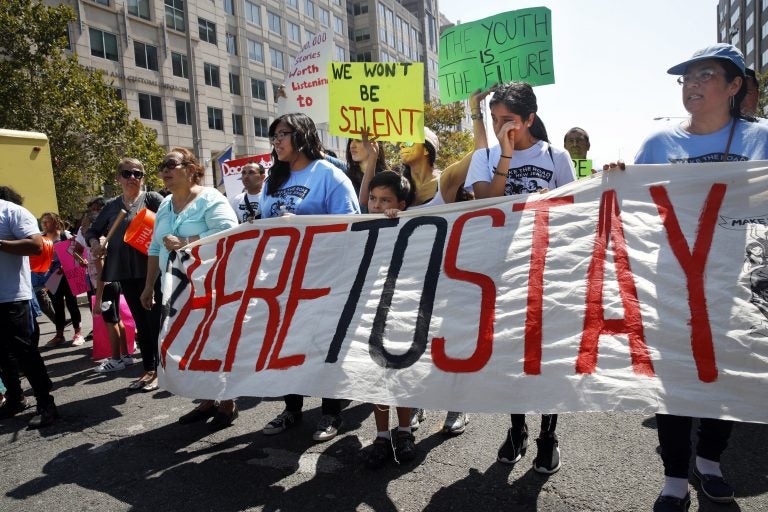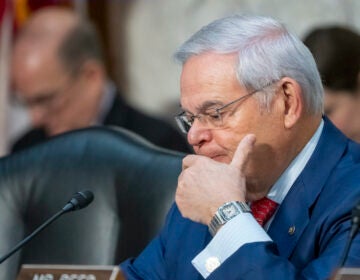New Jersey AG issues sweeping immigration order limiting cooperation with feds
Order from N.J. attorney general avoids "sanctuary" label, but severely limits how much local police can cooperate with ICE.

Cielo Mendez, 17, of Plainfield, N.J., who is a DACA recipient, (second from left with banner), marches next to Gabriel Henao, 7, and Kimberly Armas, 15, of Elizabeth, N.J., in support of the Deferred Action for Childhood Arrivals program, known as DACA, outside of Immigration and Customs Enforcement (ICE), in Washington, Tuesday, Sept. 5, 2017. (Jacquelyn Martin/AP Photo)
New Jersey’s top law enforcement official has issued a broad directive to “draw a clear line” between local law enforcement and federal immigration enforcement activities.
In rules announced Thursday, state Attorney General Gurbir Grewal barred state and local law enforcement officers from honoring U.S. Immigration and Customs Enforcement detainer requests — with exceptions. Refusing to honor those requests sometimes earns jurisdictions a “sanctuary” label, although that term has no set definition. Even self-proclaimed sanctuary cities vary widely in how much they resist collaboration with ICE.
Grewal’s directive also prohibits local police and jails from joining the a federal program known as 287(g) that deputizes local authorities to do work ICE usually does — unless the attorney general signs off on the agreement.
A high-ranking ICE official said Grewal’s directive poses a danger to the safety of New Jersey’s residents.
What’s more, it “undermines public safety and hinders ICE from performing its federally mandated mission,” said ICE Deputy Director Matthew Albence.
The move is among the strongest official rebukes of President Donald Trump’s immigration policies. His administration has taken a hard line against undocumented immigrants, even those who have not committed a crime.
Grewal said Thursday the changes do not create “‘sanctuary’ for those who commit crimes in this state.”
Instead, the focus is “ensuring that victims and witnesses feel safe reporting crimes to New Jersey’s law enforcement officers,” he said. “No law-abiding resident of this great state should live in fear that a routine traffic stop by local police will result in his or her deportation from this country.”
The move earned praise from immigrant’s rights groups and immigrants themselves.
Greeted as ‘a relief’
“It is such a relief to know that our local New Jersey law enforcement agents will no longer do the work of immigration enforcement,” said Olga Armas, an immigrant and member of the group Make the Road New Jersey from Elizabeth. “For years now, my family and I have lived with the fear that a simple traffic stop or any interaction with the local police could lead to deportation.”
The directive, which takes effect March 15, replaces one issued in 2007 by then-Attorney General Anne Milgram, which mandated that police officers notify ICE when they arrested someone suspected of being an undocumented immigrant. While it forbade law enforcement officers from requesting that information of victims or witnesses, confusion caused by the policy kept immigrants from coming forward, say immigrant community advocates.
“That’s a big deal, because folks are very scared about talking to police and coming forward and being witnesses of crimes,” said Johanna Calle, director of the New Jersey Alliance for Immigrant Justice.
Under Grewal’s order, law enforcement in New Jersey must stop such notifications and cooperation between local police and federal authorities who are not working together on a specific investigation. And authorities may ask suspects about their immigration status only when “necessary to the ongoing investigation of a serious offense and relevant to the offense under investigation.” It also forbids departments from offering ICE office space.
Local police departments and jails may no longer start or renew 287(g) contracts following Grewal’s directive. Sheriff’s offices in Cape May, Monmouth and Salem counties currently hold these controversial agreements. Earlier this year, Hudson County ended its cooperation agreement with ICE.
Counties can continue housing immigrants in removal proceedings on behalf of ICE. Those often lucrative contracts can bring in hundreds of thousands of dollars per year in participating counties.
In another blow to ICE, the new directive forbids county jails from honoring detainer requests, in which immigration authorities ask local police to hold people arrested in minor crimes and suspected of being in the country unlawfully after the time they’d normally be released. Under the new guidelines, detainers can be honored only if they come with a judicial warrant — or in the event that a person has been charged with a specific violent or serious offenses, such as murder, rape, arson, assault, bias crimes, and domestic violence-related offenses. In the latter case, local jails may notify ICE and hold that suspect only until 11:59pm of the day they would otherwise be released.
“Ultimately, this directive shields certain criminal aliens, creating a state-sanctioned haven for those seeking to evade federal authorities, all at the expense of the safety and security of the very people the N.J. attorney general is charged with protecting,” said Albence, the ICE deputy director.
ICE officials and the U.S. Department of Justice have publicly criticized, and in some cases threatened to subpoena, jurisdictions with similar policies. In the case of some “sanctuary” cities — including Philadelphia — the DOJ has tried to withhold grant funding to convince them to reverse those policies, sparking lawsuits.
These sweeping policy changes follow Democratic Gov. Phil Murphy’s campaign vows to turn New Jersey into a “sanctuary state” to protect undocumented immigrants brought to the country as children from deportation. Murphy nominated Grewal.
WHYY is your source for fact-based, in-depth journalism and information. As a nonprofit organization, we rely on financial support from readers like you. Please give today.




